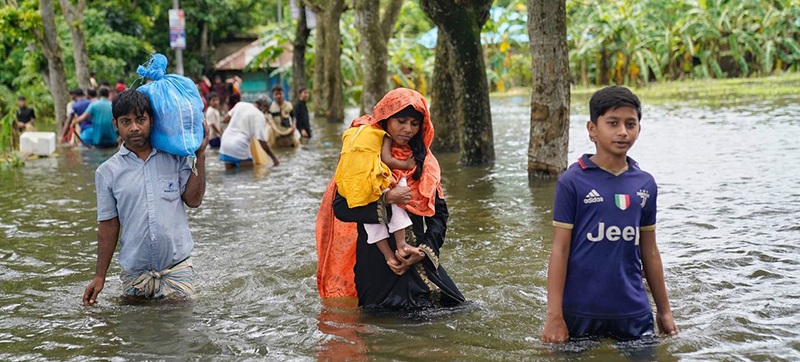
Half the world lacks social protection amid climate crisis, says ILO
Social protection is essential to safeguard people from shocks, but half the world is without any coverage, including over 90 per cent of people living in climate-vulnerable countries, according to a new report released on Thursday by the International Labour Organization (ILO).
Around 50 per cent of us do have access to at least one social protection benefit – but 3.8 billion people lack any kind of safety net, including 1.8 billion children worldwide, according to the World Social Protection Report 2024-26: Universal social protection for climate action and a just transition.
“Climate change does not recognise borders, and we cannot build a wall to keep the crisis out,” said Gilbert Houngbo, ILO Director-General. “The climate crisis affects us all and represents the single, gravest threat to social justice today.”
Findings showed that governments are failing to make full use of the powerful potential of social protection to counter the effects of the climate crisis and support a just transition to a greener future.
Reflects ‘deeply divided world’
For the first time, more than half of the global population (52.4 per cent) has some form of social protection, climbing from 42.8 per cent in 2015, the year when the Sustainable Development Goals (SDGs) were adopted, according to the report.
But, in the 20 countries most climate-vulnerable, 91.3 per cent of people – or 364 million – still go without. More broadly, in the 50 most climate-vulnerable countries, 75 per cent of the population – or 2.1 billion people – are lacking protection.
“The stark disparity in the right to social protection is a reflection of our deeply divided world,” said Mia Seppo, ILO Assistant Director-General. “The most urgent challenge is protecting those at the frontline of the climate crisis.”
Globally, most children (76.1 per cent) still have no effective social protection coverage, and a substantial gender gap persists, with women’s effective coverage lagging behind men by 50.1 and 54.6 per cent, respectively.
These gaps are especially significant, given the potential role of social protection in softening the impact of climate change, helping people and societies adapt to a new climate-volatile reality and facilitating a just transition to a sustainable future.
The ILO chief cautioned that many of the countries experiencing the most brutal consequences of this crisis are particularly ill-equipped to handle its environmental and livelihood consequences.
“We must recognise that what happens to impacted communities will affect us all,” he said.
How social protection helps
Social protection can help people adapt to and cope with climate-related shocks by providing social protection benefits, such as income security and access to healthcare, and cushion families, workers and enterprises during the green transition.
It can also enable more sustainable economic practices, including supporting employees with training and upskilling for employment in green and low carbon sectors.
“Social protection is essential to ensure that the ongoing green and low-carbon energy transition leaves no one behind,” ILO chief Houngbo said. “The imperative to make social protection universal is not only ethical; it is also practical.
“By supporting and protecting workers everywhere, we can help to alleviate fears about the transition, which is essential to mobilise popular support for a sustainable and just transition.”
Jonalyn Millana, a health monitor in the ILO’s cash for work activity Rebuilding Better Coconut Economy project with the government of Japan, explained how social protection helps.
“When it comes to social safety, like a health insurance, we don’t know when a typhoon will hit,” she said. “I am more protected now because if anything happens, I will have something to receive like for example insurances like PhilHealth [health insurance], SSS [social security]. I feel safer because I have social protection.”
Governments must step in
Despite its role as a catalyst and an enabler of positive climate action, governments are failing to make the most of social protection’s potential, largely because of persistent coverage gaps and significant underinvestment, the new report found.
On average, countries spend 12.9 per cent of their gross domestic product (GDP) on social protection, excluding health. However, while high-income countries spend an average of 16.2 per cent, low-income countries allocate only 0.8 per cent of their GDP to social protection.
Low-income countries, including the most climate-vulnerable States, need an additional $308.5 billion a year, or 52.3 per cent of their GDP, to guarantee at least basic coverage and international support will be needed to reach this goal.
‘Time to up the ante’
The ILO report calls for decisive and integrated policy action to close protection gaps, arguing that, “it is time to up the ante” and invest significantly in social protection.
Recommendations to help guide policy and ensure effective and sustainable outcomes include preparing for both “routine” life cycle risks and climate-related shocks with social protection systems and using social protection to support climate change mitigation and adaptation efforts while securing public acceptance of those measures.
The report also recommends prioritising investment in social protection, including external support for countries with limited fiscal space.
Support Our Journalism
We cannot do without you.. your contribution supports unbiased journalism
IBNS is not driven by any ism- not wokeism, not racism, not skewed secularism, not hyper right-wing or left liberal ideals, nor by any hardline religious beliefs or hyper nationalism. We want to serve you good old objective news, as they are. We do not judge or preach. We let people decide for themselves. We only try to present factual and well-sourced news.





